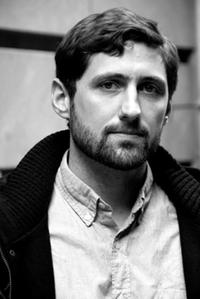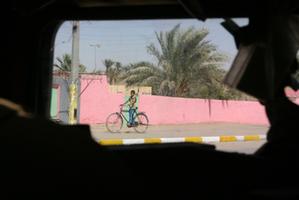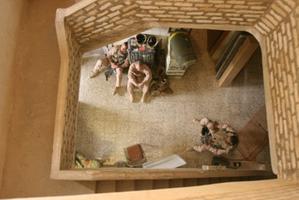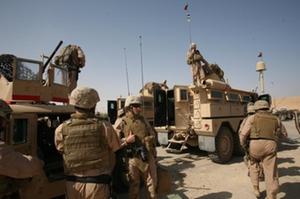
|
|
| photo: Hanna Dunphy | |
Phil Klay is a graduate of Dartmouth College and a veteran of the U.S. Marine Corps. He served in Iraq's Anbar province during the surge as a public affairs officer. After his discharge, he went to Hunter College and received an MFA and attended NYU's Veterans Writing Workshop. His story "Redeployment" was originally published in Granta and is included in Fire and Forget: Short Stories from the Long War. His writing has also appeared in the New York Times, Newsweek, the Daily Beast, Tin House and The Best American Nonrequired Reading 2012.
As you were writing, did you see yourself heading toward an entire collection of war stories, or did that happen later?
The first sentence I wrote was the first sentence of the book: "We shot dogs." I didn't know where I was heading, exactly, but I had a voice and a set of experiences I wanted to write about. Not personal experiences--just things people I had known had gone through that stayed in my mind. And not all of those fit into one story, or one perspective. I found that, to get at the different aspects of Iraq I wanted to explore, I had to approach from all these different angles.
One of the book's strengths is the many different kinds of soldiers you write about, from lance corporals to officers, foreign service officers to chaplains, young to old.
That was very intentional. There's a long tradition in war literature of veterans coming back and telling it like it is, like Paul Bäumer in All Quiet on the Western Front going to his former classroom and telling the students that there's nothing good about dying for your country. Then there's a tradition in war literature of vets that goes even further, like Tim O'Brien in The Things They Carried, explaining that at times a true war story can't be believed by those who didn't experience it because "sometimes it's just beyond telling." In both of these cases, the vet writer has the authority of experience, so there's this divide set up between the veteran understanding of war reality and the civilian ignorance. I think of Robert Graves and Alan Hodge asserting that "by the end of 1918 there were two distinct Britains... the Fighting Forces... and the Rest," or Siegfried Sassoon telling us that "The man who really endured the war at its worst was everlastingly differentiated from everyone except his fellow soldiers."
 The problem is that within that group of people who have been to war there's as much variation of experience as there is within any other type of human activity. And I wanted to tease out some of those differences. The narrators of my stories interpret what they've been through in different ways. They go through radically different experiences and make very different choices. I wanted them to argue against each other and so open a place for the reader to enter in and engage. I don't necessarily think that the person who has been through an experience gets to be the ultimate arbiter of what that experience means.
The problem is that within that group of people who have been to war there's as much variation of experience as there is within any other type of human activity. And I wanted to tease out some of those differences. The narrators of my stories interpret what they've been through in different ways. They go through radically different experiences and make very different choices. I wanted them to argue against each other and so open a place for the reader to enter in and engage. I don't necessarily think that the person who has been through an experience gets to be the ultimate arbiter of what that experience means.
Is this why all of your stories are first-person narration?
Yes. I wanted to try to drill down into these heads and try to figure out how they'd been shaped by what they'd done. Besides, I found it fascinating. There are all these jobs and all these things people did that are incredible and strange. What is it like to be a chaplain in a dysfunctional unit? What is it like to be an artilleryman who never comes into contact with his targets? Exploring that raised all these questions for me. Questions about war and patriotism and masculinity and the relationship between the soldier and the citizen and the nation at war.
None of the stories are from an Iraqi perspective. Why not?
There are Iraqi characters in the book, and the relation of the various characters to the Iraqi people comes up in many of the stories, but I had a fairly specific intent with the collection and so a specific frame I was working within. I also wasn't sure how I could have a lone Iraqi voice without having that seem to try to represent some unified Iraqi perspective, which was exactly the thing I was trying to avoid when talking about Marines.
There are many brutal and horrific scenes and episodes in the stories that are hard to take emotionally, like the Mortuary Affairs soldier collecting remains, or descriptions of soldiers being wounded or killed. How hard was it to write these passages?
I feel like it's the things that you don't want to think about that are often the things worth writing about. It's very strange getting out of the Corps and then moving to New York, because there's so little sense here that we're a nation at war. And yet, people I knew were going overseas time and again. A few of them were injured. One Marine I had very briefly known died in an IED blast not long after I got out. It's hard to wrap your head around. And then there's the continuing violence in Iraq and its toll on the Iraqi population, which now you're learning about through the news, the same as everyone else, but which you're able to think about in a way you couldn't while you were overseas because it was just too much.
 A few stories deal with soldiers who are now back and adjusting.
A few stories deal with soldiers who are now back and adjusting.
It's a radical transition for a variety of reasons. Even soldiers and Marines who haven't been to war can find going from the military to the civilian world to be a surreal experience. And that is amplified considerably if you've been overseas. I think the contrast of the two cultures, civilian and military, can be revealing of both.
Why did you decide to join the Marines?
Because I was in my early 20s and I cared about public service and my nation was going to war. I knew our conduct overseas would impact millions of lives, primarily Iraqi and Afghan lives, and I wanted to do my part.
After your first round of service, had you considered staying in longer?
I extended a little bit beyond my initial obligation but I always figured I'd get out and go back to civilian life. I didn't do that without any regrets. There's a certain amount of guilt I felt, knowing that people with much harder jobs than mine were going on their fourth or fifth deployments.
Tell us about your participation in NYU's Veterans Writing Workshop.
That's where I found a group of really smart and talented veteran writers, like Roy Scranton and Perry O'Brien and Jake Siegel and Matt Gallagher, to share work and ideas with. It was a group of people who cared about the issues I did, and who'd argue them with me or recommend what to read or read my writing and tear it up with really smart, important edits. I couldn't get away with certain types of BS that civilian readers would let me slide on. That said, I had civilian readers from Hunter who would pick up on different types of BS that the vets wouldn't catch. Writing this book required a lot of conversations with a lot of people. I had to slowly learn how to write this book in order to write it.

It's not that there's one thing I want people to understand about this war so much as I want people engaged with it. If you're an American citizen, it's your war. It's not the soldier's war, or the Marine's war. The soldier and the Marine do not issue themselves orders.
War literature has been its own genre for some time now. What novels or stories do you feel are authentic and valuable and worth recommending to readers?
I don't know if authenticity is always the first thing I'm looking for in literature, war related or otherwise. I wouldn't call The Iliad an authentic portrait of the Trojan War any more than I'd call Richard III an authentic portrait of late 15th-century English politics. Jaroslav Hašek's World War I novel The Good Soldier Svejk isn't particularly interested in being realistic, so I don't know how it fares on the question of authenticity, but it does have the virtue of being incredibly good. I'd like to think my book is authentic. I did a lot of research and talked to a lot of vets in order to get things as right as I could, but my ultimate aim was to do more than just achieve some kind of verisimilitude.
I'll say this. Reading Joseph Conrad's Lord Jim was important to me and it informed my thinking while writing this book. That's not really a war book, though. Then there's Isaac Babel's Red Cavalry. Anthony Powell's 12-volume sequence A Dance to the Music of Time. Seamus Heaney's North and Station Island. Colum McCann's TransAtlantic is less about war than about the work of crafting peace, but it's a book I've thought about a lot since I finished reading it. Beer in the Snooker Club by Waguih Ghali is not really a war book, either, but there's a long scene where two Egyptian characters go drinking with a British soldier that is also important to me. What else? Grant's Memoirs. Tolstoy's War and Peace. The war poetry of Kenneth Koch and James Dickey. Nathan Englander's short stories. There's plenty of great war or war-related writing.
So what's next--more short stories or a novel, or perhaps nonfiction?
I'm working on a novel. We'll see how it goes. --Tom Lavoie
photos courtesy of the author

